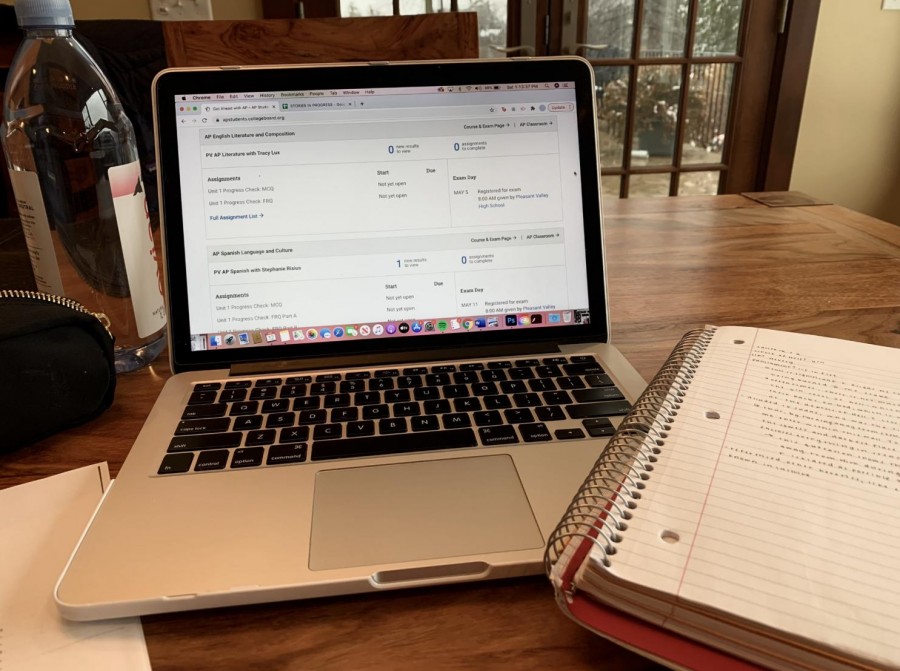Every early to mid-May, the controversial College Board proctors Advanced Placement (AP) exams across the world to assess students’ knowledge of particular subject areas, scoring them on a five point scale.
Students often begin preparing for the notorious exam approximately three months before it is administered through a variety of different methods: reviewing notes, taking practice tests and, for some, investing in AP workbooks published by companies like Princeton Review or College Board itself.
Last spring, however, the COVID-19 pandemic shut down schools throughout the country during the normal testing period, forcing College Board to quickly restructure its well-known exams to allow students to take it from the comfort of their home. The adapted exams only focused on course material that would have been taught by mid-March per AP standards.
For 2021, though, College Board has announced that the exams will remain in their original format. But with school districts throughout the world each running different learning models due to the pandemic, it is imperative that AP exams are adapted again to accommodate the unconventional 2020-2021 school year.
Information about COVID-19 changes daily, and Dr. Anthony Fauci, Director of the National Institute of Allergy and Infectious Diseases, claims that the United States will not reach a sense of pre-pandemic normalcy until the end of 2021.
As a result, many schools, including Pleasant Valley, have adopted online or hybrid learning models through the end of the year — which significantly reduces the amount of in-person instruction students receive and forces many teachers to adapt their curriculum to adhere to the new schedule.
Senior Cyrus Barati has noticed these changes in AP class curriculums in order for the class to stay on schedule with AP standards; however, the changes have placed more emphasis on students to ensure they are learning as much as they would during a normal year.
“All of my AP classes have made significant cuts to the material learned,” he shared. “And it isn’t [the teachers’] fault, but we only have half the time than normal to learn a lot more ourselves.”
Junior Will Fairman, who is taking four AP classes this year, also noted the learning challenges that students are facing during this time and prompts College Board to adjust the exams accordingly. “AP needs to understand this difference in learning is not entirely the fault of students,” he lamented. “Teachers can not deliver the same quality of education because they simply do not have the time or the resources to match this year’s challenges.”
Since these exams provide countless students with the opportunity to earn college credit, scholarships and other awards, it is crucial that College Board reexamines the way it plans to deliver the exams to ensure students will still be able to receive the same opportunities for future success.
“AP tests are going to go horribly this year if cuts or adaptations aren’t made,” Barati argued. “I wouldn’t be surprised if AP scores nationally were at an all time low by a significant amount because of significant cuts and minimal time to teach the material.”
While College Board faced the demanding task of reformatting the exams in only a few short weeks last spring, that does not have to be the case this year. With approximately five months until the exams are set to take place, College Board has ample time to alter the exams to better meet the needs of students who have faced new learning methods and adapted to curriculums to fit the pandemic.
These adjustments ensure students the opportunity to potentially earn college credit, and give teachers a clearer idea of what they need to teach, and possibly even allow them to spend more time on particular topics.
For an organization that claims to be “a mission-driven not-for-profit organization that connects students to college success,” its lackluster response to a global crisis that has impacted numerous students’ educations and futures has demonstrated otherwise.
“It’s absolutely insane that no adaptations will be made to the tests,” Barati protested. “Students are forced to adapt their learning style for the exams, and teachers are extremely stressed and have to change curriculum that they have had set in place for years, yet the AP exam won’t be changing. “The AP tests need to accommodate for that like they did last year.”
College Board, I, along with other students, plead with you to adapt the AP exams for the success of students across the globe.







